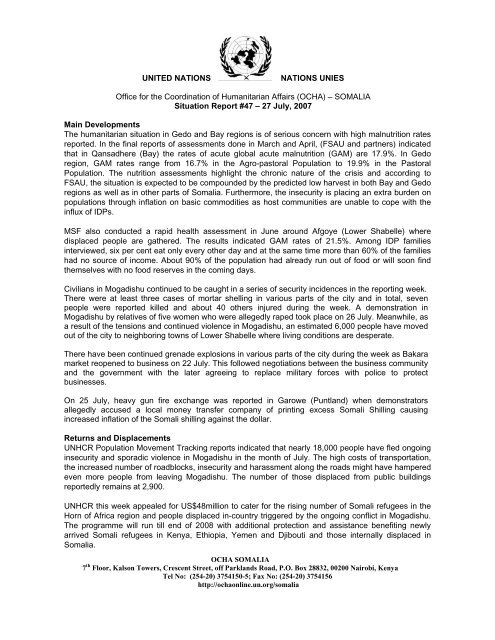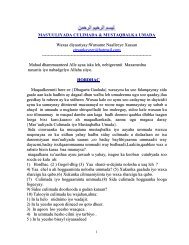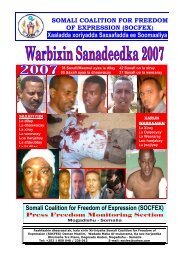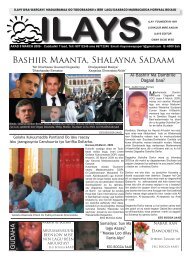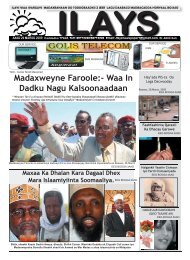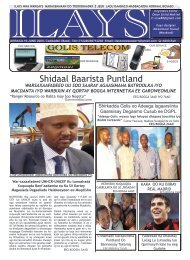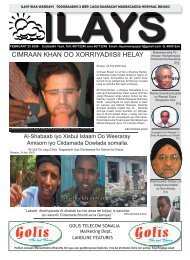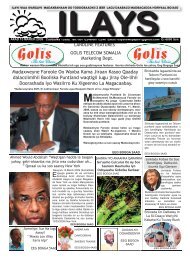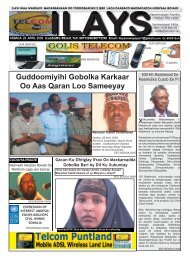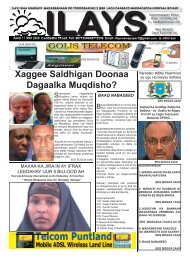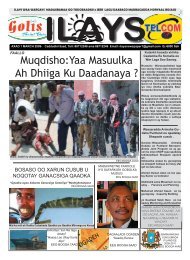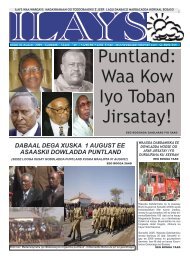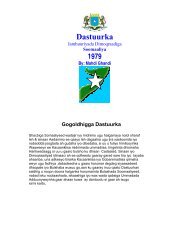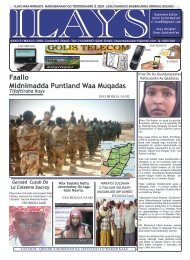Somalia Humanitarian Situation Report 47: 27 July 2007 - Somali Talk
Somalia Humanitarian Situation Report 47: 27 July 2007 - Somali Talk
Somalia Humanitarian Situation Report 47: 27 July 2007 - Somali Talk
Create successful ePaper yourself
Turn your PDF publications into a flip-book with our unique Google optimized e-Paper software.
UNITED NATIONS<br />
NATIONS UNIES<br />
Office for the Coordination of <strong>Humanitarian</strong> Affairs (OCHA) – SOMALIA<br />
<strong>Situation</strong> <strong>Report</strong> #<strong>47</strong> – <strong>27</strong> <strong>July</strong>, <strong>2007</strong><br />
Main Developments<br />
The humanitarian situation in Gedo and Bay regions is of serious concern with high malnutrition rates<br />
reported. In the final reports of assessments done in March and April, (FSAU and partners) indicated<br />
that in Qansadhere (Bay) the rates of acute global acute malnutrition (GAM) are 17.9%. In Gedo<br />
region, GAM rates range from 16.7% in the Agro-pastoral Population to 19.9% in the Pastoral<br />
Population. The nutrition assessments highlight the chronic nature of the crisis and according to<br />
FSAU, the situation is expected to be compounded by the predicted low harvest in both Bay and Gedo<br />
regions as well as in other parts of <strong><strong>Somali</strong>a</strong>. Furthermore, the insecurity is placing an extra burden on<br />
populations through inflation on basic commodities as host communities are unable to cope with the<br />
influx of IDPs.<br />
MSF also conducted a rapid health assessment in June around Afgoye (Lower Shabelle) where<br />
displaced people are gathered. The results indicated GAM rates of 21.5%. Among IDP families<br />
interviewed, six per cent eat only every other day and at the same time more than 60% of the families<br />
had no source of income. About 90% of the population had already run out of food or will soon find<br />
themselves with no food reserves in the coming days.<br />
Civilians in Mogadishu continued to be caught in a series of security incidences in the reporting week.<br />
There were at least three cases of mortar shelling in various parts of the city and in total, seven<br />
people were reported killed and about 40 others injured during the week. A demonstration in<br />
Mogadishu by relatives of five women who were allegedly raped took place on 26 <strong>July</strong>. Meanwhile, as<br />
a result of the tensions and continued violence in Mogadishu, an estimated 6,000 people have moved<br />
out of the city to neighboring towns of Lower Shabelle where living conditions are desperate.<br />
There have been continued grenade explosions in various parts of the city during the week as Bakara<br />
market reopened to business on 22 <strong>July</strong>. This followed negotiations between the business community<br />
and the government with the later agreeing to replace military forces with police to protect<br />
businesses.<br />
On 25 <strong>July</strong>, heavy gun fire exchange was reported in Garowe (Puntland) when demonstrators<br />
allegedly accused a local money transfer company of printing excess <strong>Somali</strong> Shilling causing<br />
increased inflation of the <strong>Somali</strong> shilling against the dollar.<br />
Returns and Displacements<br />
UNHCR Population Movement Tracking reports indicated that nearly 18,000 people have fled ongoing<br />
insecurity and sporadic violence in Mogadishu in the month of <strong>July</strong>. The high costs of transportation,<br />
the increased number of roadblocks, insecurity and harassment along the roads might have hampered<br />
even more people from leaving Mogadishu. The number of those displaced from public buildings<br />
reportedly remains at 2,900.<br />
UNHCR this week appealed for US$48million to cater for the rising number of <strong>Somali</strong> refugees in the<br />
Horn of Africa region and people displaced in-country triggered by the ongoing conflict in Mogadishu.<br />
The programme will run till end of 2008 with additional protection and assistance benefiting newly<br />
arrived <strong>Somali</strong> refugees in Kenya, Ethiopia, Yemen and Djibouti and those internally displaced in<br />
<strong><strong>Somali</strong>a</strong>.<br />
OCHA SOMALIA<br />
7 th Floor, Kalson Towers, Crescent Street, off Parklands Road, P.O. Box 28832, 00200 Nairobi, Kenya<br />
Tel No: (254-20) 3754150-5; Fax No: (254-20) 3754156<br />
http://ochaonline.un.org/somalia
Access and Response<br />
Flight delays and increased costs might be experienced by the <strong><strong>Somali</strong>a</strong> humanitarian community as the<br />
Kenya Civil Aviation announced that all flights coming from <strong><strong>Somali</strong>a</strong> must stop in Wajir (north eastern<br />
Kenya) for security clearance. The move followed the lifting of a seven month commercial flight burn by<br />
the Kenyan authorities into <strong><strong>Somali</strong>a</strong>. Meanwhile, all UNCAS flights leaving <strong><strong>Somali</strong>a</strong> will be routed<br />
through Wajid (Bakol) from 1 August for passenger and cargo screening which is seen as a necessary<br />
aviation security procedure.<br />
Main transport delays during the reporting period were caused by restricted access along the transport<br />
routes in Middle and Jower Juba. Two damaged bridges between Jilib and Kamsuma as well as the<br />
broken bridges at Kamsuma and Jilib are causing movement delays. At Kamsuma alone a delay of up<br />
to 7 days during the off-and on-loading process is being experienced. Meanwhile, on 25 <strong>July</strong>, about 70<br />
WFP trucks were obstructed by government troops in Jilib on their way from Kismayo to Buale. The<br />
convoy was later released following talks between WFP staff and the soldiers with no clear reasons<br />
given for the disruption.<br />
Over the past week, WFP and CARE consignments have continued to cross the Kenya/<strong><strong>Somali</strong>a</strong><br />
border. In total, 136 trucks with 4,006mt of food have passed the border into <strong><strong>Somali</strong>a</strong>. Some 2,219mt<br />
of food aid remaining will soon be loaded. CARE <strong><strong>Somali</strong>a</strong> is now in the process of distributions. In<br />
Gedo a total of 28,611 households will benefit from 3,130 metric tons of mixed commodities (sorghum,<br />
lentils and corn soya blends). Luug district distributions were completed over the weekend (21/22<br />
<strong>July</strong>). In Galgaduud, CARE also has ongoing distributions of 738 metric tons of mixed commodities to<br />
13,173 households of local communities while ICRC has been covering IDP populations. In Hiran and<br />
Middle Shabelle, Emergency Food for Work initiative is ongoing though no food has been distributed<br />
yet. Both CARE and WFP are distributing food through medical partners to supplementary feeding<br />
centers in Hiran and to local TB centers.<br />
In Buale, Sakow and Salagle (Middle Juba), WFP distributed 1,300 metric tons of mixed commodities<br />
(15 – 21 <strong>July</strong>) to 10,786 households. In Bardera (Gedo) a distribution of 1,159 metric tons of food<br />
targeting 9,374 households started on 22 <strong>July</strong> and is ongoing. WFP’s Food for Work programmes as<br />
well as school feeding programmes are also ongoing in Bakool and Lower Shebelle covering 18<br />
schools. The program also continues in <strong>Somali</strong>land and Puntland targeting a total of 140 schools.<br />
Plans are underway to commence the program in Mogadishu.<br />
Acute Water Diarrhea (AWD) cases have drastically reduced in Lower Juba regions with no new<br />
cases reported in the last three weeks. This follows sanitation interventions by UN agencies, INGOs<br />
and local NGOs working in the area.<br />
For further information, contact:<br />
Rita Maingi at +254 722 334 671 - maingir@un.org or<br />
Petra Costerman Boodt +254 734 210 102 - boodt@un.org<br />
OCHA SOMALIA<br />
7 th Floor, Kalson Towers, Crescent Street, off Parklands Road, P.O. Box 28832, 00200 Nairobi, Kenya<br />
Tel No: (254-20) 3754150-5; Fax No: (254-20) 3754156<br />
http://ochaonline.un.org/somalia


